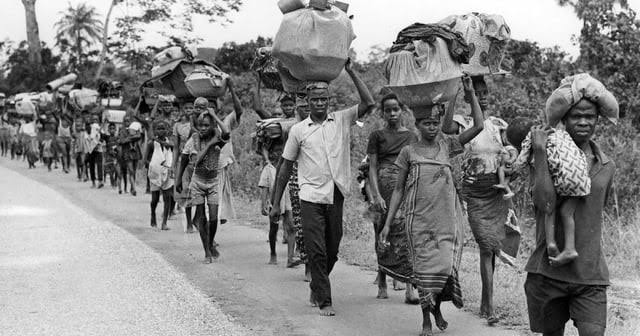The Igbo pogroms of the 1960s, marked by a series of massacres against Igbo and other southern Nigerian communities, were a pivotal moment in Nigerian history, ultimately leading to the declaration of the Republic of Biafra and the Nigerian Civil War. The violence, which began in May 1966 and escalated after September 29 of the same year, resulted in the deaths of between 8,000 and 30,000 people, with a further one million forced to flee their homes in the Northern Region. These events, described by Colin Legum of The Observer (UK) as a pogrom, were a response to the January 15, 1966 coup, which some interpreted as an Igbo plot to take control of Nigeria from the Northern region.
The retaliatory coup by Northern officers led to the massacre of Igbo civilians, including men, women, and children, in a brutal wave of violence that shocked the nation. A Sierra Leonean living in Northern Nigeria at the time wrote home in horror, stating, “The killing of the Igbos has become a state industry in Nigeria.” What made these massacres particularly horrifying was the orchestration by government authorities, including the army and police, who were supposed to protect the people. Despite the scale of the atrocities, no one was held accountable, leaving a deep scar on the nation’s psyche.
The pogroms prompted a mass exodus of Igbo and other Eastern Nigerians back to the East, with estimates suggesting that more than one million people returned to the region. This movement, coupled with the failure of the Nigerian government to address the injustices and atrocities committed, culminated in the declaration of the Republic of Biafra by Lieutenant Colonel Chukwuemeka Odumegwu Ojukwu on May 27, 1967.
The Biafran Declaration of Independence cited the premeditated murder of innocent Eastern Nigerians, the destruction of their property, and the conversion of millions into refugees as key factors justifying secession from Nigeria. The declaration marked the beginning of the Nigerian Civil War (1967–1970), also known as the Biafran War, which resulted in immense human suffering and loss of life. Despite the eventual reintegration of Biafra into Nigeria and the declaration of “no victor, no vanquish,” the scars of the war and the pogroms remain, underscoring the need for genuine reconciliation and healing.
The legacy of the Igbo pogroms and the Biafran War serves as a reminder of the consequences of ethnic and religious divisions and the importance of addressing grievances and injustices to build a more united and inclusive Nigeria.
References:
- Nigeria – Igbo Pogrom.” GlobalSecurity.org, www.globalsecurity.org/military/world/war/igbo-pogrom.htm.
- Chinua Achebe. “The Killing of the Igbos Has Become a State Industry in Nigeria.” There was a country, 1966.
- Ojukwu, Chukwuemeka Odumegwu. “Biafran Declaration of Independence.” Harper & Row, 1969.

Leave a Reply
You must be logged in to post a comment.